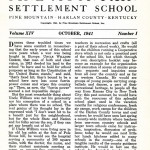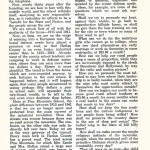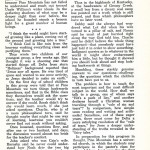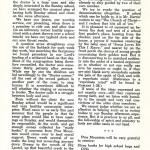Pine Mountain Settlement School
Series 17: PUBLICATIONS PMSS
NOTES 1941
October
NOTES – 1941
“Notes from the Pine Mountain Settlement School”
October
GALLERY
Our problems and opportunities have multiplied together, as the world has come to us by way of the railroad, the road, the radio, and the telephone.
We are struck … with the similarity of the times — 1913 and 1941. Now, as then, we are on the verge of entering into a European war.
Here at Pine Mountain, the great difference between 1915 and 1941 is that we are no longer apart and protected from the main current of the industrial revolution.
In the gathering shadows of what may be a deeper night than ever before, the school [Uncle William Creech] founded stands a beacon light for a great number of human beings.
- NOTES – 1941 October, page 1. [PMSS_notes1941_oct_001.jpg]
- NOTES – 1941 October, page 2.[PMSS_notes1941_oct_002.jpg]
- NOTES – 1941 October, page 3.[PMSS_notes1941_oct_003.jpg]
- NOTES – 1941 October, page 4.[PMSS_notes1941_oct_004.jpg]
TAGS: NOTES – 1941 OCTOBER: William Creech, medical service, community work, Cooperative Store, recreation, institute, camps, WWII, Kansas City, New York City, Harlan County; religion, medicine, Mr. and Mrs. Harris, Mrs. Ethel de Long Zande, Miss Katherine Pettit
TRANSCRIPTION: NOTES – 19xx [Month]
P. 1
NOTES FROM THE
PINE MOUNTAIN
SETTLEMENT SCHOOL
PINE MOUNTAIN * HARLAN COUNTY * KENTUCKY
Copyright, 1941, by Pine Mountain Settlement School, Inc.
Volume XIV OCTOBER, 1941 Number I
DURING these troubled times we have some comfort in remembering that the early years of this school were years when a war was being fought in Europe. UNCLE WILLIAM CREECH, that man of faith and clear vision, in 1913 deeded his land to the school “to have and to hold for school purposes as long as the Constitution of the United States stands,” and said, “that’s fixed hit; thar’s bound to be a school here now less some furrin power comes and wipes this country up.” Then, as now, the “furrin power” seemed a not impossible danger.
But the most remarkable thing about Uncle William was not his generosity nor his conception of a school in a place where there was no school. The real genius of his thought lay in the expressed wish “I don’t want hit to be a benefit just for the neighborhood, but for the whole State and Nation and for folks across the sea, if they can get any benefit out of hit.”
If Uncle William were living now in his old log cabin at the foot of Pole House hill, he would see the hospital serving a community of 300 square miles, with the doctor, the nurse, and their student assistants meeting as many as seventy-five patients in a day; he would see a group of girls and boys going out over the community, carrying with them medical supplies, distributing books from a pack horse library, and assisting district school teachers in recreation and crafts (all a part of their school work). He would see the children running a Cooperative store which is not only a practical part of the school life, but which through its own descriptive booklet may become an example for the organization and execution of scores of similar projects: requests and inquiries come from all over the country and as far as western Canada. He would see groups of young people carrying song-ballads and dances, a part of their recreational heritage, to people all the way from Kansas City to New York City; this past summer, he would have seen the resources of this splendid school plant used in the vacation months for religious conferences, fresh air camps, work camps for the children of the Harlan County towns and coal centers; he would have seen last spring a county-wide institute where teachers from one-room country schools and larger town schools came for instruction, inspiration, discussion of problems; today he would see neat little hot lunch kitchens added to many schools in the county — one of the tangible results of the county guidance institute. He would in fact see the school he founded touching and influencing the lives of thousands of individuals in every corner of this county and far outside the county and the state of Kentucky.
Yes, Pine Mountain has steadily…
P. 2
…moved toward wider service such as Uncle William, Mrs. [Ethel de Long] Zande and Miss [Katherine] Pettit dreamed of. Our problems and opportunities have multiplied together, as the world has come to us by way of the railroad, the road, the radio, and the telephone.
Now, nearly thirty years after the founding, we are face to face with this outside world, and the school rethinks itself, analyzing its new responsibilities, as it redoubles its efforts to be a “benefit for the State and Nation, and the people across the sea.”
We are struck first of all with the similarity of the times — 1913 and 1941.
Now, as then, we are on the verge of entering into a European war. National defense needs have placed a premium on coal, so that Harlan County is an even busier industrial center than in 1915-1918. Already some of the county school teachers are resigning to work in defense industries, where they can earn more than ten dollars a day. Money is more plentiful. The trend is from the farms, which are over-crowded anyway, to seek fortunes in the coal mines. It happened before, and it will happen again, that many people accustomed to seeing perhaps fifty dollars a year in actual cash, will squander their new-found wealth, to be left in the end even more destitute than before.
Here at Pine Mountain School, the great difference between 1915 and 1941 is that we are no longer apart and protected from the main current of the industrial revolution. Then the stream was remote because there was no road across the mountain. The confusion on the other side was only indirectly felt over here. Today we are at the very gateway of the turmoil. Every main fork in Harlan County has a paved road. The road across Pine Mountain, for which Mrs. Zande and Mrs. [Celia Cathcart] Holton raised a large sum of money, and which was begun in 1917, was completed in 1935 by CCC labor. We cannot pretend to ourselves a remoteness which no longer exists. The world has come, with the roar of a new machine age, and we are of it. It is useless to deplore, or to excuse, or even to condone. We do have ahead of us a great and growing task, which we are attacking with vigor, and all the wisdom we command. Yet every child who comes to us today presents a new problem, growing directly out of our closeness to the world, and the impact of industry, expanded and speeded by the recent defense needs. Here, for example, are some of the questions which we must ask ourselves:
Shall we try to persuade our boys, against their wishes, to go back to unproductive hillside farms, or shall we give them the best training we can for the city or town where so many of them want to go?
What can we do for the ambitious girls who cannot go to college, when the two chief alternatives are early marriage or work as domestics in some metropolis, at $25.00 a month?
How can we help our rural people keep a sense of proportion, while they are increasingly exposed to the ideals of Broadway and Hollywood, by way of the radio and motion picture?
How can we persuade the most talented to stay here where their leadership is so badly needed, when they are the ones who most easily attract to themselves the opportunities outside?
How can we inspire our youth to become good rural school teachers at $75.00 a month for seven months when a coal loader in the mines can make that much in ten days?
How shall we keep the fine traditions and the culture indigenous to our people from being stifled? How shall we preserve the country dance in the age of shag and conga? The ballad song in the blare of hill billy tunes?
How shall we make secure the simple religious instincts of the mountain people, when the emotional pull of the primitive Holiness church grows more irresistible every day?
They all come to us now — the child from the far off head of the hollow; the child from the camp who has no home because his parents are separated, or one or both are dead; the child without apparent need of us in these ways, but who has rare ability, outstanding qualities for future leadership…
P. 3
…in the mountains. How shall we determine which one needs us most?
We are glad to share with you some of the problems which arise in this period of testing and trial — the transition days. It is deeply satisfying to know that we face such problems now because Pine Mountain has not failed to understand and reach out toward Uncle William’s wider ideals. In the gathering shadows of what may be a deeper night than ever before, the school he founded stands a beacon light for a great number of human beings.
* * *
“I think the world might have started growing like a plant, coming out of the ground and growing into a tree.”
“I think God is like rain from the heavens washing everything clean and purifying them.”
Thus wrote two children of our youngest group, a few weeks ago. Brit thought it was a shooting star that started things off. Delta from stern “Holiness” background reported that “Jesus saw all space. He was tired of space and wanted to see some activity; so Jesus decided to make an earth.” On the first day of school children in this group were told that at Pine Mountain we turn things backwards sometimes, and that in the Bible class they themselves would ask the questions, and the teacher would try to answer if she could. Sarah didn’t think she would learn much, if she just asked questions. Charlie, who is of a more philosophical turn, said he thought maybe that might be one way of learning, leastwise you couldn’t never find out much without asking.
Once loosened, questions flew, and after one or two hesitant, arid days, the discussion waxed almost too brisk for the teacher’s comfort.
John asked who was Cain’s wife. Barnaby said he never could understand how Noah driv the two big “dinners” (dinosaurs) into the boat. Jewel observed wonderingly that “before they got the world made hit looked like they weren’t ary platform for God to stand on.” George said hit looked to him like a pack of foolish lies and fairy stories altogether, and Delta said hit were the word of God and mankind hadn’t ought to handle it noways. Charlie figured that as far as God was concerned they weren’t no way of knowing about him, because you couldn’t know anything you didn’t know how to know.
Thus in the highlands of Kentucky, at the headwaters of Greasy Creek, a small boy from a dreary coal camp has pointed out a truth which is still argued, and [that] which philosophers have no later word.
Debby said she always had wondered what Lot did when his wife turned to a pillar of salt, and Nancy said he must of just hurried right along the way God told him. Charlie said he didn’t believe the whole thing happened that somebody must have just told it in order to show something. Indignant queries as to whatever in the world it might show embarrassed him a little, but he thought it showed you should look ahead and stop looking backwards at things.
Humbling, these starkly genuine answers to our questions — challenging, the questions which the children in turn have put to us.
The problem is how to teach the most important and the most difficult subject in the world. How shall we talk to a group, one of whom says “Hit’s a pack of lies,” and another declares herself a Christian woman traveling through a “vale of sin and tears”? In comparison, how simple seem reading and writing and arithmetic! Sometime, out of these eager years, there must come for Delta a more satisfying resolution of the “vale of tears,” for Jesse a deeper understanding of the truths revealed in the “fairy tales.”
In preparation for this progress in thought, Pine Mountain has a universal church, in which the students may participate in the pastor’s class for older children. Last year for the first time the older students received communion with the staff. Sunday Vesper services are planned and conducted by the boys and girls. Our lovely Chapel is a fitting temple and it is here that our classroom questions about God…
P. 4
…will doubtless find their truest answers.
* * *
The new Sunday school-clinic at the mouth of Far Axhandle Branch has been the subject for much comment among our neighbors. Because the doctor is a busy man and also deeply interested in the Sunday school, we have arranged the unusual plan of having both Sunday school and clinic on the same afternoon.
We have our lesson, our worship service, our preaching, when there is a preacher to ride out, and after that (in an infirmary corner hastily improvised with a sheet thrown over a school bench) we have our typhoid shots and our sore throat swabs.
A question arose straightway over the use of the Sabbath for such week day work, but searching the Scriptures we found precedent in our Lord’s healing of a withered hand on that day. Most of the congregation being therefore reconciled, the doctor sees sometimes thirty patients after service. While one by one the children are led unwillingly to the “Doctor corner,” all the rest of the crowd gathers in another part of the room to sing hymns. It is sometimes difficult to tell whether the singing or screaming is louder. The doctor calls it a struggle between body and soul.
Even without the clinic the new Sunday school would be a significant and very healthy community enterprise. Word came to us early this past summer that the people in that far away place would like to have meetings on Sunday, and would themselves be responsible, do the work, and get enough money collected for “study books,” if someone from Pine Mountain would come over to lend moral support. Every week several of us make the long but rewarding journey down Greasy to the mouth of Big Laurel, up that beautiful creek to the picturesque little cabin at the mouth of Axhandle, where the Sunday school, the day school, and all community gatherings are held, where the corn is ground, and the hogs are vaccinated. Mr. and Mrs. Harris, who live there, are the leaders of the community, and together do all the work of formal settlement directors, teaching, nursing, farming, even carrying on an annual fair day for the people. We at Pine Mountain feel especially glad to be invited by the people here to give encouragement to a community already so ably guided by two of their own number.
We try to evade the question of denominations altogether. If asked which one he holds to, it is Mr. Harris’ custom to say, “The Church of Christ — and I reckon that hits all of ’em.”
It is pleasant to sit squeezed up between the desk and seat of a school first grader’s place, hearing from the chicken yard on the far side of the house, a joyous if tuneless rendering by the baby ones of “Jesus Loves Me This I Know,” and nearer by on the front porch the chorus of young people memorizing their golden text. But it is disconcerting to be snatched suddenly into the midst of a heated argument as to whether or not one really can love his enemies or ought to, if they are pint blank sorry scoundrels outside the pale of the spirit of God, and with a reprobate mind. (Reference to a “reprobate mind” will be found in ROMANS 1:28.)
* * *
If some of the ideas expressed are not exactly ours — still they represent strong faith, and we listen with humility to the simple and very real convictions of the older class members.
We cannot judge whether we are as effective in helping souls as in curing bodies in our Sunday afternoon experience. But it is precious to us all, and the fellowship of spirit and ministry to body are alike oases in our land.
* * *
Pine Mountain will be very grateful to receive:
Story books for high school boys and Girls
Copies of Thorndike’s Junior Dictionary
Sheets, towels, wash cloths, blankets
Sewing machine and used grand piano to replace those lost in fire
Christmas gifts for high school boys and girls
Previous:
NOTES – 1940
Next:
NOTES – 1942
See Also:
RELIGION
RELIGION Guide
Return To:
NOTES Index





